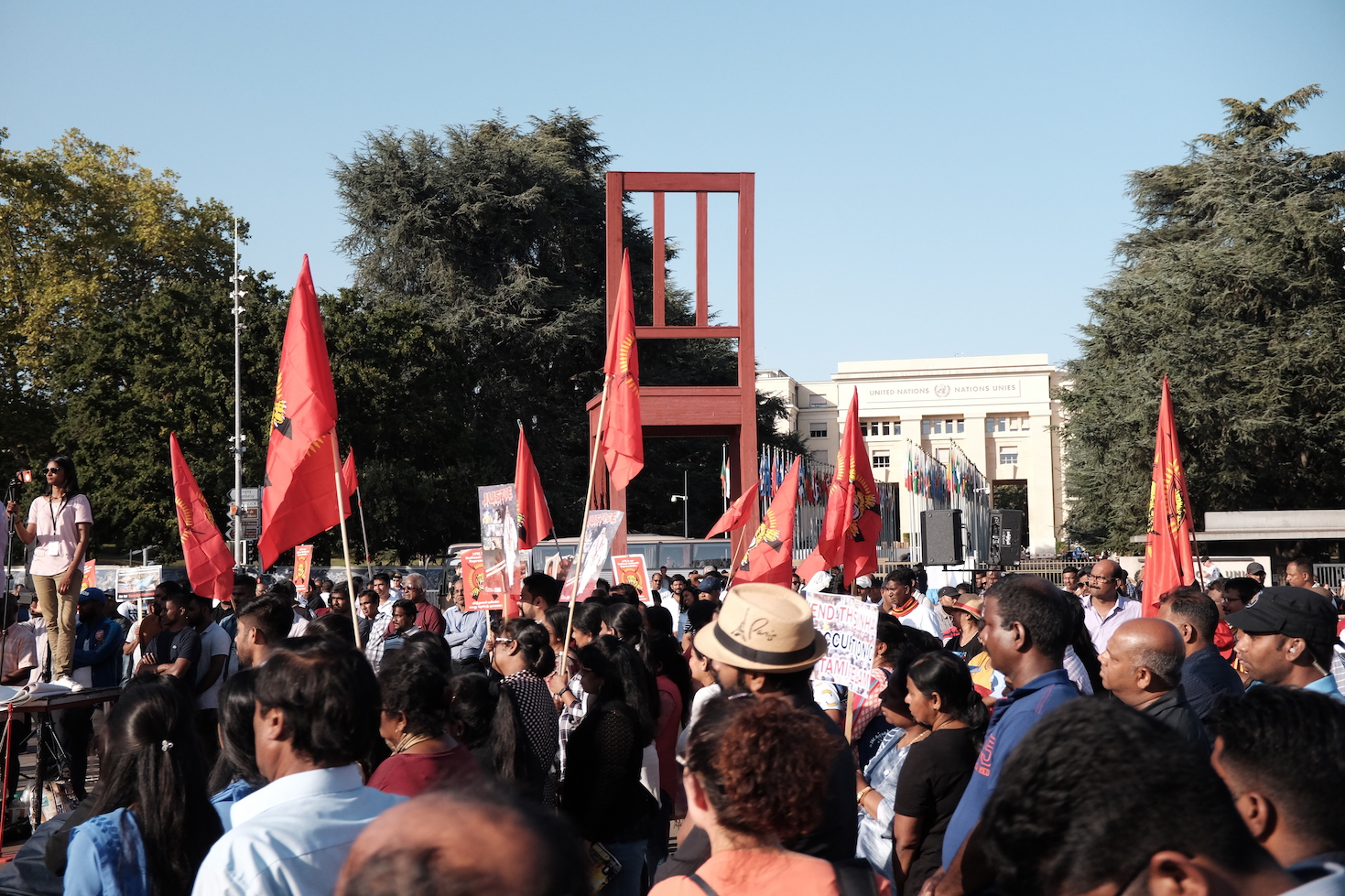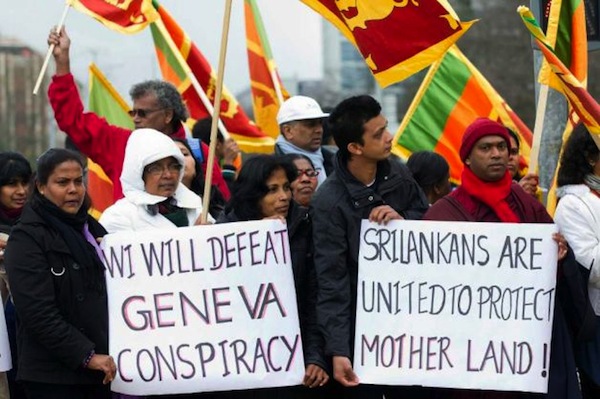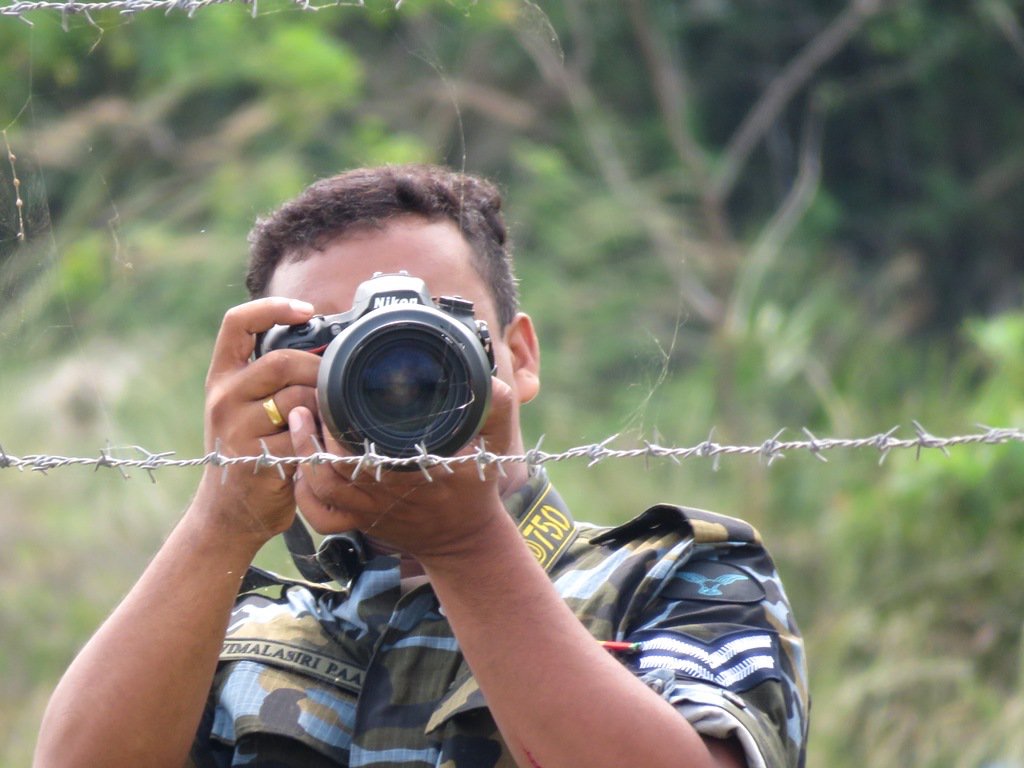Ahead of UNHRC session, Sinhalese protest in Geneva
— Tamil Guardian (@TamilGuardian) August 28, 2022
'The appeal from Sri Lanka to UNHRC follows a deeply antagonistic relationship in which the country’s leaders have consistently attacked the institution and alleged a bias'
: @sunandadesh https://t.co/DyObc9izSz pic.twitter.com/v5LzfiC51h
Ahead of the 51st session of UN Human Rights Council (UNHRC) session, Sinhala demonstrators have arrived in Geneva demanding a withdrawal of the emergency act and the dissolution of parliament.
The protests follow a heavy crackdown on anti-government demonstrators and the detention of Sinhala student activists under the Sri Lanka Prevention of Terrorism Act.
The appeal from Sri Lanka to UNHRC follows a deeply antagonistic relationship in which the country’s leaders have consistently attacked the institution and alleged anti-Sri Lankan bias. During the last session, Sri Lanka’s then foreign secretary, G.L. Peiris slammed the last resolution as sowing the seeds of disharmony in Sri Lanka and breeding hatred. Sarath Fonseka, a prominent opposition leader, went further, accusing the UN High Commissioner for Human Rights Michelle Bachelet of harbouring LTTE sympathies. Under Gotabaya Rajapaksa, Sri Lanka withdrew its from the UNHRC resolution.

Photographs courtesy of Sagi Thilipkumar
For decades Tamils have protested in Geneva ahead of the UNHRC, demanding justice for the genocide they have suffered and the continued military occupation. They faced routine harassment and intimidation from Sri Lankan security officials.

(Photo credit: Journalists for Democracy Sri Lanka)
Following the 2012 resolution, which called on Sri Lanka to implement the Lessons Learnt and Reconciliation Commission (LLRC), Sri Lanka’s ruling party organised widespread demonstrations against the resolution and called on government employees to join their protest. Sri Lankan minister, Mervyn Silva even threatened to "break the limbs" of traitors who bring disrepute to Sri Lanka.
The BBC correspondent Charles Haviland that;
“In March this year, state-owned ITN (television) started using slots in its Sinhalalanguage bulletins to denounce Sri Lankan journalists, some in exile and some still at home, who it said were betraying the motherland. It did not name them but repeatedly zoomed in on thinly disguised photos of them, promising to give their names soon and expose more traitors.”
Peiris would defend this conduct, claiming that those shown by the ITN were working against the national interest. The UN Chief Navi Pillay would stress to Sri Lanka that there must be no reprisals against Sri Lankan rights defenders who participated in Geneva. However, activists both in the country and in Geneva faced routine harassment.
This would repeat itself in 2017 when UN Human Rights Commissioner, Zeid Raad Al Hussein, expressed his concern regarding the reports of intimidation against Tamil activists in Geneva.

In May 2021, a British tribunal ruled in favour of Tamil asylum seekers by recognising the “real risk of ill-treatment or harm” Tamils faced in Sri Lanka. Dr Smith testifying before the tribunal, highlighted the Sri Lanka apparatchiks stating:
“Both within Sri Lanka and further afield, intelligence gathering is now at the heart of security policy and posture”. He added:
“Infiltrators, informants, and other forms of surveillance such as taking photographs at demonstrations,” were deployed by the Sri Lankan state to monitor Tamil diaspora activity, he added. “All such intelligence is sent back to the Ministry of Foreign Affairs and then on to relevant intelligence sections within the State Intelligence Service (SIS), Terrorism Investigation Division (TID), Criminal Investigation Department (CID), and the Ministry of Defence.”
The International Truth and Justice Project have highlighted the pervasive use of torture in Sri Lanka against Tamil activists engaging in commemorative events, protests or for receiving funds from abroad, over the last year.
Read more here.
